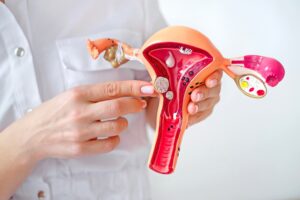Fibroid Specialist Near Dallas TX
Stop suffering from uterine fibroids and get back to life
Struggling with fibroid symptoms like heavy bleeding, pelvic pain, or frequent urination? Uterine fibroids can disrupt daily life, but effective treatment options are available. At North Texas Fibroids, we specialize in minimally invasive procedures designed to provide lasting relief.
North Texas Fibroids specializes in comprehensive fibroid care led by Dr. Robert Handley, a board-certified interventional radiologist with over 20 years of experience. Our practice is dedicated to providing minimally invasive treatments like Uterine Fibroid Embolization (UFE), an advanced non-surgical alternative to hysterectomy. Dr. Handley, who trained at the University of Texas Medical Branch at Galveston and completed a vascular and interventional radiology fellowship at UT Southwestern, is highly regarded for his expertise in image-guided fibroid treatments.
What Are Fibroids?

Uterine fibroids are benign (non-cancerous) tumors that develop within the muscle tissue of the uterus. These growths can vary in size, from as small as a seed to as large as a grapefruit, and may develop in different areas of the uterus. While fibroids are not cancerous, they can cause significant symptoms, including heavy menstrual bleeding, pelvic pain, and reproductive complications.
What Causes Fibroids?
Fibroid experts don’t know the exact cause of uterine fibroids, but research and clinical experience suggest several factors:
- Hormone Production: Estrogen and progesterone appear to promote fibroid growth, and fibroids contain more hormone receptors than normal uterine muscle cells. Fibroids often shrink post-menopause due to decreased hormone production.
- Genetic Changes: Many fibroids contain genetic mutations that differ from those in normal uterine muscle cells.
- Other Growth Factors: Substances like insulin-like growth factors may contribute to fibroid development.
Specialists believe uterine fibroids originate from a stem cell in the smooth muscular tissue of the uterus. When a single cell divides repeatedly, it creates a firm, rubbery mass distinct from nearby tissue.
Fibroids can grow slowly, rapidly, or remain stable in size. Some may go through growth spurts, while others shrink naturally, particularly after pregnancy when the uterus returns to its normal size.
Common Fibroid Symptoms
Some of the most common symptoms of uterine fibroids include:
- Heavy, excessive menstrual bleeding.
- Pelvic pain and pressure.
- Urinary incontinence and frequency.
If you are experiencing fibroid symptoms, they can significantly impact daily activities and overall quality of life. Seeking timely treatment can help manage discomfort and restore normal function.
Types of Fibroids
Fibroids vary in size and location, ranging from:
- Small (walnut-sized) fibroids to large (cantaloupe-sized or bigger) fibroids.
- Multiple fibroids may grow within the uterus, making it difficult to determine which are causing symptoms.
Understanding the different types of fibroids can help guide treatment decisions and ensure the most effective approach to symptom management.
Who is at Risk for Fibroids?
Approximately 20-40% of women over 35 have fibroids. Fibroids are more common among African-American women, with studies indicating that up to 80% of African-American women will develop fibroids.
If you have fibroids, you have treatment options. While some women may not experience symptoms, others may struggle with discomfort and health concerns. The location and size of fibroids can affect a woman’s quality of life. Seeking medical evaluation can help determine the best approach for managing symptoms effectively.
How Fibroids Impact Daily Life and When to Seek Treatment
For many women, fibroids cause significant physical discomfort and disruptions to their daily routine, including:
- Chronic fatigue due to excessive menstrual bleeding.
- Persistent pelvic pain impacting mobility and exercise.
- Frequent urination disrupts sleep and daily activities.
- Emotional stress from unpredictable symptoms.
Seeking treatment is recommended if symptoms interfere with daily activities, worsen over time, or impact reproductive health.
Fibroids and Pregnancy
Fibroids can impact fertility and pregnancy, increasing the risk of:
- Miscarriage.
- Preterm labor.
- Complications during delivery.
Women planning pregnancy should discuss fibroid treatment options, such as UFE or myomectomy. Early intervention can help minimize risks and improve reproductive health outcomes.
What are the Risks of Leaving Fibroids Untreated?
While fibroids are benign, untreated fibroids may lead to:
- Increased pain and discomfort.
- Severe anemia due to heavy bleeding.
- Bladder and bowel pressure.
Managing fibroids early can prevent long-term complications and improve overall well-being.
How Does UFE Compare to Surgery for Fibroid Treatment?
Uterine Fibroid Embolization (UFE) is a non-surgical alternative to procedures like hysterectomy or myomectomy. Key advantages of UFE include:
- Minimally invasive approach.
- Shorter recovery time.
- No incisions or scarring.
- Preserves the uterus.
Discussing all available treatment options with a specialist can help determine the best approach based on your unique needs.
Why Choose North Texas Fibroids for Fibroid Treatment?
At North Texas Fibroids, we provide expert, patient-centered fibroid care. Our advantages include:
- Leadership by Dr. Robert Handley, a board-certified interventional radiologist with 20+ years of experience.
- Minimally invasive UFE treatments, offering an alternative to surgery.
- State-of-the-art imaging technology, ensuring precise and effective care.
- Personalized treatment plans, tailored to each patient’s symptoms and health goals.
- Convenient outpatient procedures, with quick recovery times and minimal downtime.
Choosing a trusted provider, like North Texas Fibroids, ensures you receive high-quality care tailored to your unique needs.
Take Control of Your Health with Expert Fibroid Care
Regain comfort and well-being with expert fibroid treatment at North Texas Fibroids. Contact us today at (469) 218-2209 to learn how our minimally invasive solutions can help you feel your best.
